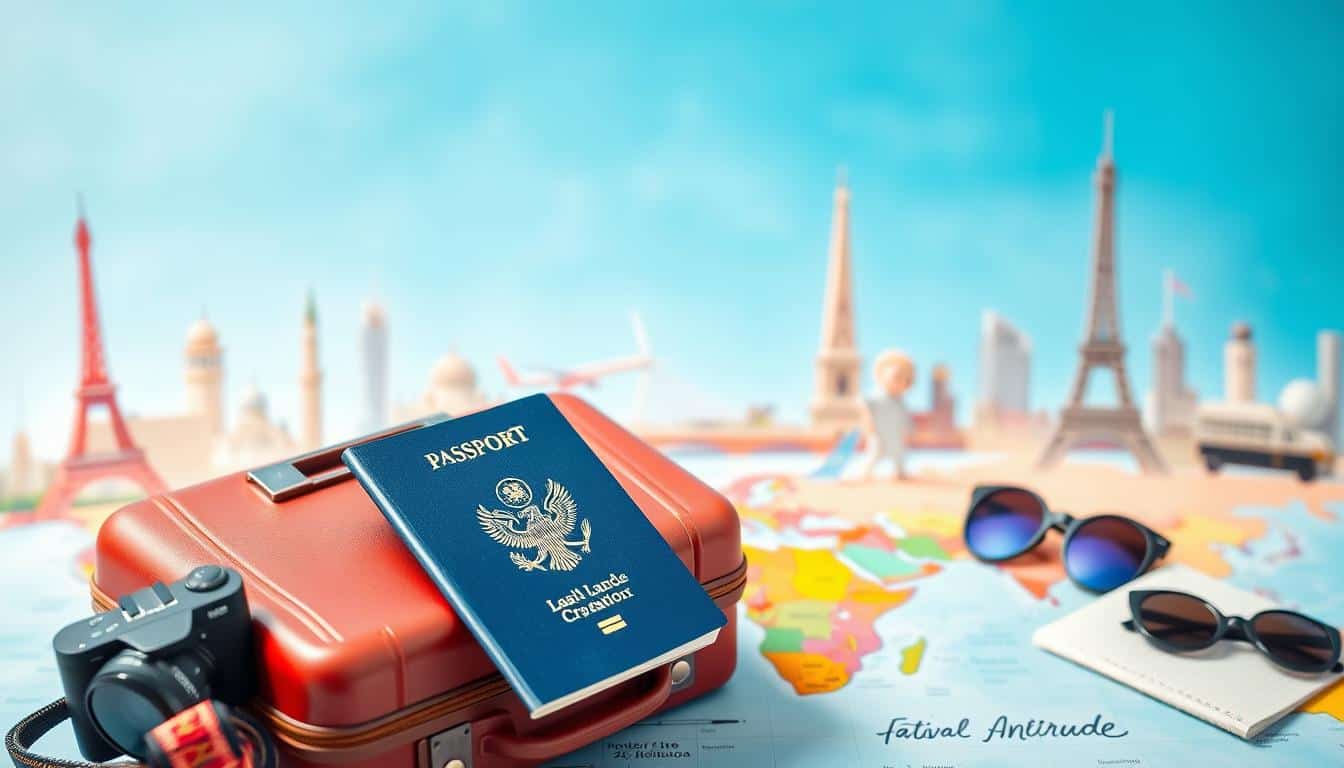Exchange Visas
Boost Your Freedom Without Compromise.
- Who offers the CHEAPEST program available.
- Who offers the BEST program available.
- What you need to qualify?

Key Takeaways
- Discover the various types of exchange visas and their distinct features
- Understand the eligibility requirements and necessary documentation for a successful application
- Learn about the visa application process, including the interview and processing times
- Explore the benefits of exchange programs, from cultural immersion to professional development
- Uncover tips and strategies for funding your international experience
Exchange visas open doors to exciting global adventures. They offer a way to explore new cultures and unlock valuable opportunities. These visas can shape your personal and professional growth in amazing ways.
Curious about what makes exchange visas special? Want to know how to use them for life-changing journeys? This guide will reveal all you need to know.
In This Article, You Will Discover:
We'll explore different visa types, eligibility rules, and application steps. You'll also find insider tips for a smooth experience.
Exchange visas stand out by offering unique chances for growth. They allow for cultural immersion and career-boosting experiences. These visas cater to students, young professionals, and curious adventurers alike.
- Who offers the CHEAPEST program available.
- Who offers the BEST program available.
- What you need to qualify?
 Free Consultation
Free Consultation Easy to Use
Easy to Use 100% Safe & Secure
100% Safe & Secure
What are Exchange Visas?
Exchange visas let people travel, study, or work abroad for a set time. They promote cultural exchange and education. These visas offer new experiences for students, young pros, and culture fans.
Definition and Overview
An exchange visa is a short-term permit for activities abroad. It covers studying, interning, working, and joining cultural programs. These visas last from weeks to years, based on the program and country rules.
Types of Exchange Visas
Exchange visas come in many forms for different needs. Here are some common types:
- Student Exchange Visas: These visas allow students to study at foreign educational institutions, often as part of an exchange program or semester abroad.
- Work and Holiday Visas: These visas permit young adults to work and travel in a host country, often for a specific period, to gain international experience and cultural exposure.
- Cultural Exchange Visas: These visas enable individuals to participate in cultural exchange programs, such as teaching, volunteering, or performing arts, with the goal of fostering cross-cultural understanding.
- Internship and Trainee Visas: These visas allow individuals to gain practical work experience in a foreign country, often as part of a structured internship or training program.
Exchange visas offer a chance to explore new cultures. You can gain skills and make friends worldwide. It's a great way to broaden your horizons.
Benefits of Exchange Programs
Exchange programs offer numerous advantages for personal and professional growth. These international experiences provide unique opportunities for cultural immersion and career development. They can enrich your life in many ways.
One key benefit is the chance to immerse yourself in a new culture. You'll learn about different customs and traditions while living abroad. This exploration can broaden your perspective and increase your appreciation for diversity.
Exchange programs also contribute to personal growth. You'll face challenges in a new environment and learn to communicate in a foreign language. These experiences foster independence, resilience, and problem-solving skills.
Your confidence will grow as you become more well-rounded. You'll adapt to unfamiliar situations and overcome obstacles. These skills are valuable in both personal and professional settings.
Career development is another significant advantage of exchange programs. International academic or professional experiences can enhance your resume and showcase your adaptability. You'll gain skills and connections that can open doors to new job opportunities.
Lastly, exchange programs offer the chance to build lifelong connections. You'll interact with students and professionals from around the world. These relationships can provide support, collaboration opportunities, and a deeper understanding of different cultures.
| Benefit | Description |
|---|---|
| Cultural Immersion | Opportunity to learn about different customs, traditions, and ways of life |
| Personal Growth | Develop independence, resilience, and problem-solving skills |
| Career Development | Enhance your resume and open doors to new job prospects |
| Lifelong Connections | Expand your global network and forge lasting friendships |
"Participating in an exchange program was one of the most transformative experiences of my life. It challenged me in ways I never expected, but ultimately led to personal growth and a deeper appreciation for cultural diversity." - Jane Doe, former exchange student
Eligibility Requirements for Exchange Visas
Exchange visa applicants must meet specific criteria. These include age, education, and language skills. Understanding these guidelines helps determine if you're a suitable candidate.
Age and Educational Qualifications
Most exchange programs have age limits. They typically range from high school students to young professionals. For instance, J-1 visa applicants in the U.S. must be 18-30 years old.
Many programs require a certain level of education. This could be a high school diploma or a bachelor's degree.
Language Proficiency
Proving language skills is crucial for exchange visa eligibility. Applicants may need to show English proficiency or fluency in the local language. This can be done through test scores, language courses, or interviews.
| Visa Type | Age Requirements | Educational Requirements | Language Proficiency |
|---|---|---|---|
| J-1 (U.S.) | 18-30 years old | High school diploma or bachelor's degree | Proficiency in English |
| Erasmus+ (EU) | 18-30 years old | Enrolled in a higher education program | Fluency in the host country's language |
| Working Holiday Visa (Australia) | 18-31 years old | No specific educational requirements | Proficiency in English |
Exchange visa eligibility requirements differ widely. Research your chosen program carefully. Make sure you meet all the necessary criteria before applying.
Preparing for Your Exchange Visa Application
Getting ready for an exchange visa application can be complex. With proper preparation, you can make the process smoother. Let's explore the key steps for your application.
Required Documents
You'll need to gather specific documents for your exchange visa application. The requirements may differ based on your program and destination country.
Typical documents include:
- Completed visa application form
- Valid passport with sufficient validity period
- Passport-sized photographs
- Proof of enrollment in an exchange program or educational institution
- Evidence of financial support, such as bank statements or sponsorship letters
- Medical insurance documentation
- Police clearance certificate or background check
Visa Fees
You'll also need to pay the required exchange visa fees. These costs vary by country and program type.
Common exchange visa fees include:
- Application fee: This covers the processing of your visa application.
- Visa issuance fee: This is the fee charged by the government for issuing the visa.
- Biometric data fee: Some countries require fingerprints or other biometric data, which incurs an additional fee.
- Consular/service fee: This fee may be charged by the consulate or embassy for their services.
Research the specific fees for your exchange visa and plan your budget. Consider extra costs like courier fees or expedited processing if needed.
The exchange visa application process can vary between countries. Check with the relevant embassy for current information and requirements. Being prepared with documents and understanding fees will boost your application's success.
The Visa Application Process
Applying for an exchange visa can be tricky. But don't worry! With the right guidance, you can get your spot in an international program.
Let's look at the main steps for applying. These will help you understand the process better.
Gathering Required Documents
First, gather all the documents you need. This includes your passport and proof of enrollment or employment. You'll also need financial documents and any extra forms for your program.
Having all your papers ready will make applying much easier. It helps avoid delays and problems later on.
Submitting the Application
Now it's time to send in your application. You might be able to apply online or through an agency. Pay attention to deadlines and processing times.
These can be different for each program. Being on time is key to a smooth process.
Tracking the Application Status
After you apply, keep an eye on your application's progress. Many programs give updates on your status. Stay in touch with the authorities handling your case.
This helps you know about any delays or extra things you might need to do.
Navigating Potential Challenges
Sometimes, unexpected issues can pop up during the process. You might face delays or requests for more information. In rare cases, your visa might even be denied.
Stay patient and proactive if problems arise. Don't be afraid to ask for help from program staff or immigration experts.
| Step | Description |
|---|---|
| 1. Gather Documents | Assemble all required documents, including passport, proof of enrollment/employment, and financial documents. |
| 2. Submit Application | Apply for your exchange visa through the designated program or agency, adhering to any deadlines or processing times. |
| 3. Track Status | Monitor the progress of your application, staying in touch with the relevant authorities for updates. |
| 4. Address Challenges | If you encounter any issues or delays, be proactive in seeking guidance and resolving them. |
Understanding these steps will help you navigate the exchange visa application process. You'll be ready to make the most of your international experience.
Exchange Visas: Navigating the Interview
The exchange visa interview is a key step in your application. It's your chance to show your qualifications and excitement for the program. Good preparation is vital for success.
Common Interview Questions
The interview will assess your eligibility, motivation, and cultural understanding. You might be asked about your interest in the program. They may want to know what you hope to gain from the experience.
Other questions could focus on your contributions to the host community. You might be asked about potential challenges and how you'll handle them. They may also test your knowledge of the host country's culture.
Interview Tips
To ace your exchange visa interview, keep these tips in mind:
- Familiarize yourself with common questions: Prepare honest responses that show why you're a great fit.
- Dress professionally: Your appearance reflects your preparation and commitment.
- Speak clearly and confidently: Maintain eye contact and show enthusiasm for the opportunity.
- Be honest and transparent: Give accurate info and be open about any concerns.
- Demonstrate cultural awareness: Show you understand the host country's customs and can adapt.
Approach your interview with confidence and preparation. This will set you up for an amazing cultural exchange experience.

Visa Processing Times and Validity
Exchange visas have complex processing times and validity periods. Understanding these aspects is crucial for students, young professionals, and entrepreneurs seeking international experience. Proper planning relies on knowing application timelines and stay durations.
Exchange Visa Processing Times
Processing times for exchange visas vary widely. Factors include visa type, country of origin, and current application volumes. Times can range from weeks to months.
Research your specific visa program's typical processing time. Apply well in advance to ensure a smooth transition to your host country.
| Visa Type | Typical Processing Time |
|---|---|
| J-1 Exchange Visitor Visa | 3-8 weeks |
| F-1 Student Visa | 4-12 weeks |
| H-3 Trainee Visa | 2-6 months |
Exchange Visa Validity
Exchange visa validity periods are equally important to consider. Most visas have specific durations, ranging from months to years. Understanding your visa's validity ensures you can complete your intended activities without disruptions.
- J-1 Exchange Visitor Visa: Typically valid for 1-3 years, depending on the program.
- F-1 Student Visa: Valid for the duration of your academic program, plus an additional 60 days.
- H-3 Trainee Visa: Valid for up to 2 years, with the possibility of extensions.
Knowing your exchange visa processing time and exchange visa validity is essential. This knowledge helps you plan your international experience effectively. It ensures a smooth transition to your host country.
Extending Your Exchange Visa
Extending your exchange visa can prolong your international adventure. This process needs careful planning and following specific requirements. It can be a rewarding way to continue your stay abroad.
First, check if an extension is possible for your visa type. Some exchange visas allow extensions, while others don't. Learn the policies for your specific visa type.
Requirements for Extending Your Exchange Visa
If extension is possible, gather necessary documents and submit a formal application. This may include:
- A completed visa extension application form
- Your current exchange visa and passport
- Proof of ongoing enrollment or participation in your exchange program
- Evidence of sufficient funds to support your extended stay
- Any additional forms or documents required by the visa-issuing authority
Requirements may vary depending on your location and the country you're visiting. Check with relevant authorities to understand the exact process and timeline.
Submitting Your Visa Extension Application
Submit your application well before your current visa expires. This helps ensure timely processing and lets you continue your program without interruption.
The extension process can be complex. Stay organized, be prepared, and follow all instructions carefully. This approach can boost your chances of success.
| Visa Type | Typical Extension Validity | Additional Requirements |
|---|---|---|
| J-1 Exchange Visitor Visa | Up to 12 months | Continued enrollment in exchange program, proof of funding |
| F-1 Student Visa | Up to 12 months | Continued enrollment in academic program, proof of funding |
| H-3 Trainee Visa | Up to 18 months | Continued participation in approved training program, proof of funding |
"Extending your exchange visa can be a great way to maximize your international experience and immerse yourself in the local culture even further."
Finding Accommodation and Travel
Planning exchange visa accommodation and exchange visa travel can be challenging. Good preparation ensures a smooth experience. This guide will help you find housing and arrange transportation.
You'll be able to focus on cultural immersion and personal growth. These aspects make exchange programs truly rewarding.
Securing Accommodation
Finding suitable housing is a crucial step in preparing for your exchange program. You may choose on-campus housing, a host family, or a private apartment.
Each option has its benefits and drawbacks. Consider what fits your needs and budget best.
- On-campus housing: Convenient and program-facilitated, but may offer less independence.
- Host family: Provides unique cultural immersion, but requires adjusting to a new environment.
- Private apartment: Offers more freedom, but needs extra research and planning.
Arranging Transportation
For exchange visa travel, explore transportation options in your host country or city. Look into public transit, ride-sharing services, and other local choices.
Familiarize yourself with these options to ensure efficient and cost-effective commuting.
- Research public transportation: Learn about subway, bus, or train schedules and routes.
- Consider ride-sharing: Apps like Uber or Lyft can provide flexible transportation.
- Investigate car rental or leasing: This may be practical for exploring beyond your immediate area.
Thorough research on exchange visa accommodation and exchange visa travel sets the stage for success. You'll be ready to explore your host country and immerse yourself in local culture.

Cultural Immersion and Adjustments
Cultural immersion exchange visa programs offer exciting opportunities for growth. You'll face various cultural differences that can challenge and enrich your experience. Embrace these differences to make the most of your international adventure.
Cultural Differences
Immersing yourself in a new way of life is incredibly rewarding. You'll encounter different languages, communication styles, social norms, and traditions. Approach these differences with curiosity and a willingness to learn.
Local Customs and Etiquette
Navigating local customs can be both rewarding and challenging. Learn about dress codes, table manners, and social protocols in your host country. This shows respect and helps you avoid unintentional mistakes.
- Observe and learn from locals to understand the cultural cues and appropriate behavior
- Be mindful of non-verbal communication, such as body language and gestures, which may have different meanings
- Embrace opportunities to participate in cultural activities and traditions to deepen your understanding
| Cultural Aspect | Example |
|---|---|
| Greetings | In some cultures, a firm handshake is expected, while in others, a subtle nod or bow may be more appropriate. |
| Dining Etiquette | The use of chopsticks, the order of courses, and the role of conversation during meals can vary significantly across cultures. |
| Personal Space | The acceptable distance between individuals may differ, with some cultures valuing more personal space than others. |
Embracing cultural differences enriches your exchange visa experience. It helps you adapt to local customs and etiquette. You'll create meaningful connections with people and communities you encounter.
"The real voyage of discovery consists not in seeking new landscapes, but in having new eyes."
Funding Your Exchange Program
Exchange programs offer enriching experiences but can be costly. Luckily, various funding options can help finance your international adventure. These options can help you achieve your exchange visa goals.
Scholarships are a popular funding source for exchange programs. These competitive awards can cover tuition, travel expenses, and living costs. Research and apply for many relevant opportunities to increase your chances.
Grants are another option to consider. They don't need repayment, making them attractive for funding exchange programs. Government agencies, non-profits, and private foundations often provide these awards.
Personal savings can be a reliable way to fund your exchange program. Set aside income over time to cover costs. Some programs offer payment plans to make expenses more manageable.
| Funding Source | Advantages | Disadvantages |
|---|---|---|
| Scholarships | Substantial financial assistanceDo not need to be repaid | Highly competitiveRequire extensive application process |
| Grants | Do not need to be repaidTargeted towards specific fields or demographics | Availability may be limitedEligibility requirements can be strict |
| Personal Savings | Flexible and reliableNo application process required | Requires long-term financial planningMay not cover all program costs |
Exploring these funding options can help secure resources for your exchange program. This can unlock incredible personal and professional growth opportunities. With the right funding, you can make your international dreams a reality.
"Immersing yourself in a new culture through an exchange program is an invaluable investment in your future. With the right funding, the possibilities are endless."
Conclusion
Exchange visas offer a chance to explore diverse cultures worldwide. They allow you to broaden your horizons through immersive experiences. By understanding visa types, requirements, and application processes, you can embark on a life-changing journey.
These visas cater to various goals, from academic exchanges to cultural immersions. You can choose a program that aligns with your unique interests. Proper preparation and an open mind are key to making the most of your time abroad.
Success in an exchange program hinges on cultural exploration and adaptability. Embrace challenges and cherish moments of discovery. Let your exchange visa unlock a world of new perspectives and unforgettable experiences.
Common Questions
What is an exchange visa?
What are the different types of exchange visas?
What are the benefits of participating in an exchange program?
What are the eligibility requirements for exchange visas?
What documents are required for an exchange visa application?
How long does the exchange visa application process take?
What should I expect during the exchange visa interview?
Can I extend my exchange visa?
How do I find accommodation and arrange travel during my exchange program?
How can I fund my exchange program?
- Who offers the CHEAPEST program available.
- Who offers the BEST program available.
- What you need to qualify?
 Free Consultation
Free Consultation Easy to Use
Easy to Use 100% Safe & Secure
100% Safe & Secure





